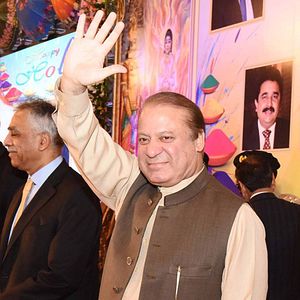Pakistani former Prime Minister Nawaz Sharif’s disqualification over corruption allegations recently has stirred up the country’s politics. The Supreme Court of Pakistan (SC) has not only disqualified Sharif from the premiership, but has also barred him from holding any public office for life.
The by-election for the National Assembly (NA) seat vacated by Sharif has become significant for a number of reasons. The election in NA-120, which is scheduled to take place next month, is not only going to define the course of the next general elections in Pakistan, but will also bring clarity to speculation that the political party in power is being isolated by other state institutions for their own broad institutional priorities and interests.
The ruling party has fielded the wife of the former prime minister as its candidate for NA-120. Sharif’s wife has no previous political experience or credentials. There are two major reasons that explain why Sharif may have chosen his own wife as his replacement candidate.
First, the growing power struggle within the party has forced Sharif into fielding his wife for the crucial seat. Sharif’s isolation within his own party is already afoot: within two weeks, the newly appointed prime minister has sidelined one of the closest aides of the former prime minister from the state’s key economic affairs. Previously, Sharif’s younger brother was offered the role but eventually some differences concerning the division of power at the provincial and federal level changed the situation.
For Sharif’s part, getting his wife elected to the NA, from where she can eventually elevated to the premiership, means staying influential in the government’s key affairs. Second, if there are any outside interventions to weaken the ruling party from within, then no other candidate is most suited to win NA-120’s by-elections than Sharif’s own wife.
NA-120 has traditionally remained a stronghold of the Pakistan Muslim League-Nawaz. While it’s an urban constancy, the voter has largely been brought out and maneuvered through the party’s patronage and business community links. While she has not yet taken an active role in the country’s politics, she is likely to win the context for her husband and the party unless something dramatic were to happen
The opposition that the ruling party is facing in NA-120 has two distinct attributes: one is highly conservative and ideological in nature and the other is motivated by political interests.
Imran Khan’s Pakistan Tehreek-e-Insaf (PTI) has recently emerged as the main political opposition party in Punjab, leaving behind the Pakistan Peoples Party (PPP), which has traditionally played the role of the opposition in the province. Khan’s party has been rallying the masses against the Sharif family’s perceived corruption in order to dampen the latter’s vote bank.
During the 2013 general elections in NA-120, Khan’s party managed to capture more than 50,000 votes against Nawaz Sharif. Now, however, If Khan’s political party can somehow win the NA-120 by election then this would cause a major upset for the ruling party, not only in terms of sustaining its unity but also in terms of the party’s internal divisions. On the other hand, even if Khan’s party loses the election with a narrow margin, in a broad context, it should be seen as a victory for the party, for it can still use the narrative of its ‘better performance’ to shore up its broad election agenda.
The third force that remains an anomaly in NA-120 by-election race is Hafiz Saeed’s newly established political party, the Milli Muslim League (MML). In 2013, Saeed had openly rejected any chances of his organization joining electoral politics. Now, however, Saeed’s party has not only announced that it will take part in the next general elections, but it has also vowed to contest the NA-120 polls in opposition to Sharif’s party.
The emergence of the MML as a political party is being considered as an effort on the part of non-civilian forces to weaken the ruling party and general civilian supremacy. It’s interesting that none of the Islamist parties that are taking part in NA-120 polls have openly opposed Khan’s candidacy or his party. In fact, it’s likely that in the coming days, Islamist parties may form some sort of electoral alliance with Khan against the ruling party.
The nature of the NA-120’s campaign and related developments illustrate a lot about how the next general elections are going to be contested in Pakistan. The results of NA-120 polls are going to characterize whether the forthcoming general elections will be free and fair or if they will be won by political forces that are being influenced by other state institutions for their own broad institutional gains.































